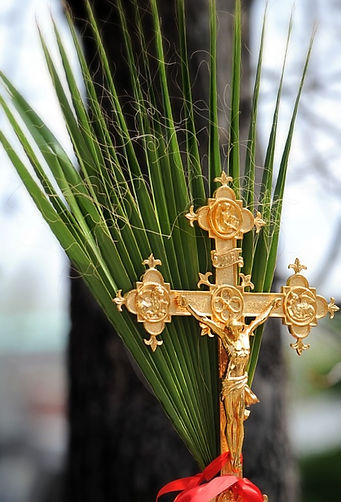
FERIA QUARTA CINERUM
01 MARCH 2017
Ash Wednesday

REVERTAMUR AD DOMINUM
LET US RETURN TO THE LORD, for we have come full circle: the palms that greeted the Redeemer King’s triumphal entry into Jerusalem are reduced to ashes; a stark reminder that we cannot fashion our own Christ, nor manufacture redemption on our own terms; that we are Adam’s sons who, “by the sweat of your brow will have food to eat until you return to the ground from which you were made. For you are dust and unto dust you shall return” (Gen. 3:19); and that we stand helpless on the day of judgement, deserving death, but for the Cross planted in the blood-soaked dust of the earth, the dust no more a prison for the dead but by that same blood redeemed for eternal life.
It is in this light that we begin our annual Lenten observance, an ashen cross marking our foreheads, not a pall of gloom cast over our journey through the liturgical year but a ray of hope that calls us to remember that “As I live, says the Lord, I have no pleasure in the death of the wicked man, rather let him turn from his evil way and live” (Ez. 33:11). Indeed, each have sinned and all deserve eternal death but if we would turn to face God we could see that he does not desire our exile from Eden but our return; and that not only does he await our return but gives us the only means to achieve it: Christ crucified for the expiation of our debt to sin and death. What fear, then, is there in admitting our wickedness; in the acknowledgment of our evil ways? What profit is there in seeking to recolour the black of sin grey, or to assuage our guilt with human justifications for our wrongdoing, when the price for our sins has already been paid? Painting heaven grey may make us feel better about ourselves, about our lives and the way we have mis-led them; black is, after all, closer to grey than to white; and wouldn’t it be comforting to think that the way we have lived our lives is deserving of heaven? But this act of self-denial denies also Christ, for for what, then, did he die if all is grey and nothing is black and white? If there is no need to turn, how, then, shall we return to the way, the truth, and the life? We can lay our own path to salvation no more than we can dictate to God the attributes of his Messiah. The palms greeted a king of human acclaim but he was arrested and deserted before the closing of the week; before he had completed his saving work. The ashes now show the futility of the human endeavour to pre-empt God’s gift of salvation; the frailty of the human condition; and the need we have for a saviour.
And yet our futility, our frailty, our insufficiency is not cause for despair but of rejoicing. For there is one who took upon himself our frailty, who made fecund our futility with the transcendent sufficiency of God, for “My grace is sufficient for you, for my power is made perfect in weakness” (2 Cor. 12:9). Let us not, then, revel in the grey but rejoice in the white into which the black of our sins has been transformed by Christ. Fear not your sins, for God’s love for you is stronger. Fear only that you recognise not that which obstructs your acceptance of his grace so freely outpoured in the Sacraments. Repent, and believe in the Gospel; rejoice in the Good News symbolised by the cross on your forehead, that God “raises the poor from the dust and lifts the needy from the ash heap” (Ps. 113:7). For just as tradition holds that the skull of our forefather, Adam, broke forth from its grave on Golgotha to be bathed in the redeeming blood of Christ, so too, all we who have died Adam’s death are raised to everlasting life after him by the blood and water that pours from the side of the Saviour: the one sacrifice of the Cross that is sufficient for all sin (Heb. 10).
So it is that the journey of repentance which is Lent begins with a turn. But the turn away from sin is not dismissive of it nor evasive of its consequences but accepts them in the loving sacrifice of God that engenders perfect contrition: true conversion of heart aroused by faith and moved by the love of God. And it is there, where we turn, our sins laid bare, that we take up our palms once more, palms grown in the ashes of repentance, and greet the Redeemer King with shouts of “Hosanna … Save, I beseech you”. But this time no more to leave him but to walk with him the way of the Cross.